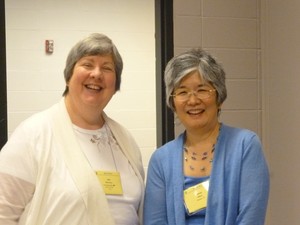A tough and timely question drew an audience of concerned Christian educators, teaching elders, ruling elders, parents, and others Friday (Aug. 2) to Anne Wilson’s eponymous Big Tent workshop: “Will our children have faith?”
Wilson, a retired Christian educator and president-elect of the Association of Presbyterian Church Educators (APCE) — which sponsored the workshop — promised that participants would leave the room with the title question answered.
And with an “elevator speech” (30 seconds or less).
Since her retirement four years ago, Wilson has devoted her time to reading, observing, and studying the changing landscape of Christian education. In a survey she conducted on the state of Christian education in the church, she found that the most widely-held view among the survey’s 765 respondents was that “Christian education is still recognized by many as vital to the church.”
However, the survey also found that “most recognize that the old patterns are no longer working and no one seems to have any idea what we should be doing to bring new life to this vital ministry.”
After recapping the history, evolution, and current state of Christian education — which most people tend to equate with “Sunday school” — Wilson said that it’s time for paradigm shift.
“In order for our children to have faith, a faith that is vibrant and transformational, we have to broaden our perspective,” she said.
The paradigm shift that Wilson and other experts are advocating includes a change not only in perspective but also in the traditional vocabulary of the church, including using the term “faith formation” in place of “Christian Education,” and “cross-generational” instead of “intergenerational.”
“Why cross-generational?” Wilson asked. “Because Jesus commands us to be that way.”
After presenting a variety of actionable ideas through which congregations can become more intentionally cross-generational — in worship, social events, mentoring, storytelling, service, mission, meetings, and learning — Wilson delivered the promised elevator speech, and with it, a hopeful answer.
“Move away from a one-size-fits-all, classroom-instruction, program-centered model,” she said, “and move toward a holistic, cross-generational approach for faith formation that connects people where they are.”
The Rev. Janet Mathieson — a Church of Scotland pastor currently serving in Mississippi on a pulpit exchange — cited the “Messy Church” movement, which originated in England and is attempting to address the same challenges.
“The issues,” she concluded, “are universal.

